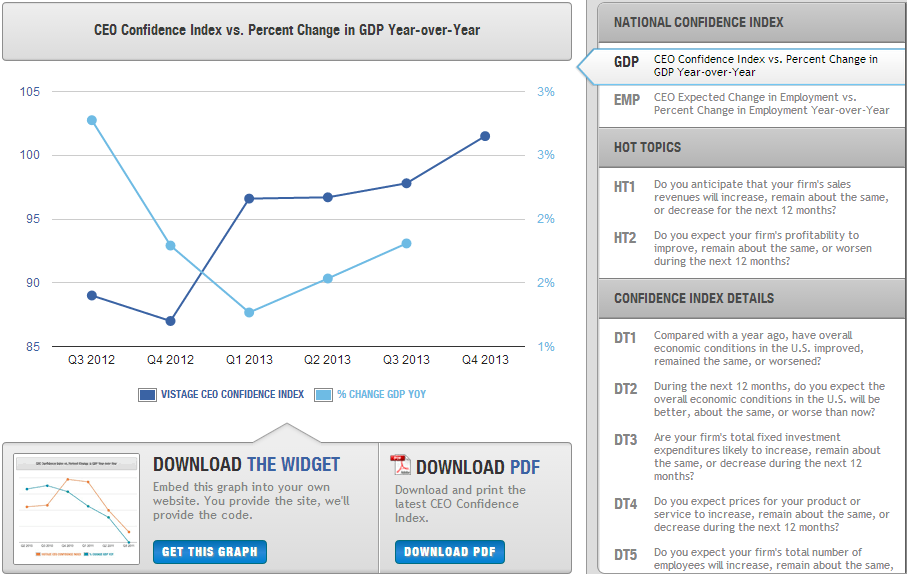Vistage CEO Confidence Index
For a look inside the Confidence Index, click the button below to view our new interactive tool. Compare the National Figures to your Industry and Region.

The Voice of Main Street Business
History
The Vistage CEO Confidence Index is a compilation of responses from more than 2,000 CEOs of small- to mid-sized companies. The Vistage CEO Confidence Index began in Q1 2003 and is the largest and only comprehensive report of small and mid-size CEO opinions and projections.
U.S. small and mid-sized businesses represent the most vital component of the nation’s economy. This sector creates 75% of all new jobs and generates 50% of all national revenue. The opinions of these business leaders provide a clear snapshot of current economic, market and industry trends and demonstrate their plans for growth over the next 12 months. These insights provide a leading indicator for employment, capital expenditure, sales, and revenue and profit trends.
When It Began
The Vistage CEO Confidence Index began in Q2 2003 when 1041 Vistage member CEOs responded to a Vistage survey, creating the baseline against which the index is measured. Since then, the Index has grown into the largest survey of chief executives from small and medium-sized businesses in the United States. Each quarter, CEOs are asked the same set of 9 questions based on the overall economy, as well as 5-7 questions relating to current economic issues. The set questions become the components of the Confidence Index score.
How is the Confidence Index Calculated?
All component questions are scored as the percent giving favorable replies minus the percent unfavorable plus 100. The Vistage Confidence Index is the sum of the components calculated as a percentage of the level recorded in the 2nd quarter 2003 survey. The results are analyzed by Dr. Richard Curtin, the chief analyst at the University of Michigan, Ann Arbor.
About Dr. Curtin
 Dr. Richard Curtin is a Research Professor and the Director of the Surveys of Consumers at the University of Michigan since 1976.
Dr. Richard Curtin is a Research Professor and the Director of the Surveys of Consumers at the University of Michigan since 1976.
Professor Curtin’s monthly report on consumer confidence is one of the most closely followed economic indicators, with findings from his research extensively reported in the media. His research is widely used by businesses and financial institutions as well as by federal agencies responsible for monetary and fiscal policies. Data from the Surveys of Consumers is an official component of the Index of Leading Economic Indicators.
Through frequent presentations and published articles, Professor Curtin has reported on his research in behavioral economics, including the theory and measurement of expectations, consumer saving and spending behavior, household income and wealth, reactions to changing economic opportunities, and public policy preferences. Professor Curtin has consulted with hundreds of corporations on issues related to future trends in consumer purchases.
Archives
- Q4 2013 Flyer
Q4 2013 Infographic - Q3 2013 Flyer
- Q2 2013 Flyer
Q2 2013 Infographic - Q1 2013 Flyer
Q1 2013 Infographic - Q4 2012 Flyer
Q4 2012 Infographic - Q3 2012 Flyer
Q3 2012 Infographic - Q2 2012 Flyer
Q2 2012 Infographic - Q1 2012 Flyer
Q1 2012 Infographic - Q4 2011 Flyer
Q4 2011 Infographic - Q3 2011 Flyer
Q3 2011 Infographic - Q2 2011
- Q1 2011
- Q4 2010
- Q3 2010
- Q2 2010
- Q1 2010
- Q3 2009
- Q2 2009